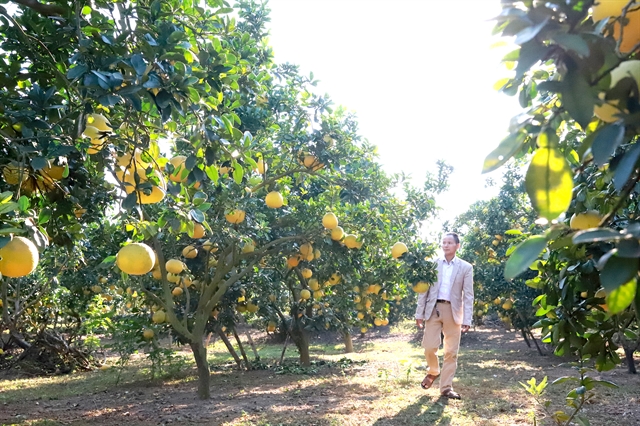 Society
Society

The granting of planting area codes is key to opening the door for Hà Nội's agricultural products to reach the world market.

|
| A pomelo garden with 300 trees at Bùi Văn Lập in Yên Bài Commune of Ba Vì District is granted a planting area code. — VNS Photo |
HÀ NỘI — The granting of planting area codes is key to opening the door for Hà Nội's agricultural products to reach the world market.
A planting area code is a certificate of identification for a growing area to facilitate the monitoring and control of production and product quality while simultaneously ensuring the origin traceability of agricultural products sold on markets.
Over the years, Hà Nội has invested in setting up planting area codes for several vital crops such as longan, pomelo and banana.
Trần Văn Bảy, a farmer in Song Phương Commune of Hoài Đức District, said that previously when the planting area code had not been granted, the late-ripening longan products of Hoài Đức District were mainly exported to China.
Even though big markets like the US or Australia have opened and products met the quality standards, without the planting area code, they could not be exported.
After being supported by the city's agricultural sector to grant planting area codes for late-ripening longan, the fruits were purchased by businesses exporting to the US and Australia.
This helped Hoài Đức's farmers stabilise production and increase income.
According to Hoàng Trung, director of the Plant Protection Department of the Ministry of Agriculture and Rural Development, regulations on growing areas, cultivation processes, semi-processing and packaging processes are required by major import markets such as China, the US and Australia.
"Planting area codes are the key to opening the door for Hà Nội's agricultural products to reach the world market," said Trung.
Phùng Thị Thu Hương, general director of Green Path Việt Nam, a business exporting late-ripen longans to the US and Australia, said: "In recent years, although the markets had different requirements for the planting area codes, in general, the growing areas that were granted the codes must apply good agricultural practices and keep a farming diary for traceability."
"In the areas, farmers must take measures to prevent harmful organisms and not to violate regulations on pesticide residues of the importing country."
According to Hoàng Thị Hòa, head of the Hà Nội Agriculture Development Centre, so far, Hà Nội has granted 22 planting area codes for key exports, of which 11 codes were for banana growing areas, eight for longan and three for pomelo.
Many code areas are very well maintained including late-ripening longan areas in Song Phương and An Thượng communes of Hoài Đức District, and Đại Thành Commune of Quốc Oai District, banana-growing areas in Văn Khê Commune in Mê Linh District, and pomelo growing in Yên Sở and Cát Quế communes of Hoài Đức District and Nam Phương Tiến Commune of Chương Mỹ District.
Phùng Văn Hà, director of Núi Bé Pomelo Co-operative in Nam Phương Tiến Commune, said that the co-operative expected export enterprises to closely connect with co-operatives of which raw material areas have been granted codes so that the quality of agricultural products are ensured and improved.
The Hà Nội agricultural sector needed to strengthen the management of growing areas to prevent violations related to planting area codes, said Hà.
Meanwhile, Hòa said that the Hà Nội Agriculture Development Department would promote the granting and management of planting area codes.
The department also focused on training farmers using input materials economically, safely and effectively, and recording and completing the production process dairies to serve traceability, Hoà said.
Chu Phú Mỹ, director of the Hà Nội Agriculture and Rural Development Department, confirmed that the city agricultural sector would ask agencies and local governments to strengthen inspection of the management and use of planting area codes and strictly handle violations.
In addition, the department will continue to carry out measures to form production links. Local authorities and State management agencies will also take measures to prevent the introduction of agricultural products grown in other areas without codes, said Mỹ. — VNS




